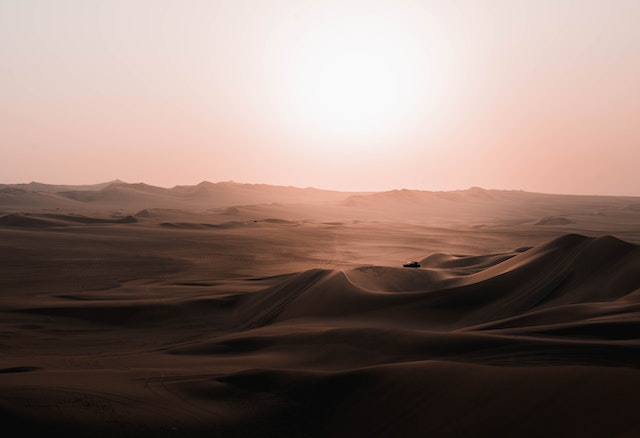Practising English podcasts
- Full podcast list
- Podcast content and transcripts
- Listen and read - stories
- Listen and read - grammar
Story starts at 6:00

It's the middle of April. And I'm looking at an app on my phone. The weather app, which forecasts the weather. There is even one page which tells you a forecast for the next two weeks. No rain. No rain in April. We haven't had rain for weeks. I live in the south of Spain, in Seville, and we're really suffering from the effects of a serious drought. No rain for the rest of April.
In May, it doesn't rain very much at all. We can't expect much rain. Then the summer begins. And the summer in the south of Spain is very, very hot. With no rainy days at all, usually. So we're quite worried here in the south of Spain. I've written a story, which is called The Great Dying. The Great Dying actually refers to a time in the past, millions of years ago, when a huge number of plants and animals died because of the rise in temperatures of the Earth. Not caused by man of course, man was not around.
We face a similar situation these days. So I've written a story about that. And brought out some relevant language for you about the weather and climate change. And this language is for B1 students, especially, with lots of B1 language in there for you. So here we go...
So, first of all, we have weather words, I suppose weather we can separate from climate because weather is about day to day changes. You know, sunny days, rainy days, cold days, hot days. In the story, we get words like a gentle breeze, which is a soft wind. Nice on a summer's day. And a cool wind which is similar to a gentle breeze, blue skies. Usually we like blue skies, don't we? But when they're always blue, it can be a problem.
We prefer clouds, cloudy days and less sunshine. And then you have extreme weather like a storm, lightning, which is the electrical light that you see in the sky, and the thunder, which is the noise caused when the lightning strikes - lightning strikes, past tense, struck by lightning.
So when we're talking about climate change, we talk about things which are more serious, more permanent floods, where water covers the land, flooded fields, or the opposite - drought. Drought, where there is no water on the land. The land is dry, and things will not grow - plants won't grow, and animals suffer.
What causes global warming? Well, the use of fossil fuels, such as oil, which we bring up from under the ground, and convert to petrol, for example, which we put directly into our cars, or the use of gas which we also bring up from the ground. And we use it to heat our homes. And coal as well, which is used as a source of energy, coal, that black rock.
Well, what I mention in the story are the solutions like wind power, and solar power, wind power of course, is the energy produced by wind blowing on these huge wind turbines which produce electricity or solar power, which is produced by the sun shining onto solar panels, which then produces electricity.
Okay, so here is the story. Listen out for those words that I've mentioned. And enjoy the story! Here we go...
The audio script of the story is not included here.
Copyright © 2023 Practising English
All rights reserved